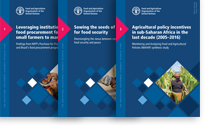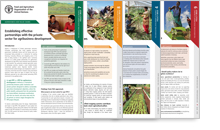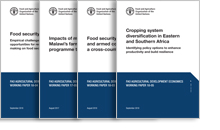Publications
Publication series
Latest publications
How agrifood systems transformation through accelerated climate actions will help achieving food security and nutrition, today and tomorrow, In brief
Major report, 2023
In 2022, 738.9 million people faced hunger, nearly 2.4 billion in 2022 lacked regular access to adequate food, and over 3.1 billion could not afford healthy diets. The pandemic added 120 million to the number...
Available in:English
Policy brief, 2023
FAO Agricultural Development Economics Policy Brief, No. 67.
Evaluation of the Action Against Desertification Programme (AAD) in Northern Nigeria. To address the lack of baseline information, a counterfactual scenario was built based on ex ante spatial...
Available in:English
The case of Action Against Desertification in Northern Nigeria
Working paper, 2023
FAO Agricultural Development Economics Working Paper, No. 23-06.
By using a multimethod strategy, we seek to generate more rigorous evidence on landscape restoration and its impacts at the household level. Using pre-restoration remote-sensing data, a machine-learning algorithm...
Available in:English
Leveraging social protection to enhance farmers’ climate adaptive capacities
Information product, 2022
This brief explores new evidence on the relationships between social protection and farmer resilience to drought-related shocks through adopting adaptive agricultural practices. The main aim is to identify challenges and opportunities to implement integrated strategies...
Available in:English
Policy brief, 2022
FAO Agricultural Development Economics Policy Brief, No. 47.
The findings of this brief have been adapted from the FAO Agricultural Development Economics Working Paper 22-02 Reducing vulnerability to weather shocks through social protection – Evidence from the...
Available in:English
FAO Agricultural Development Economics Working Paper 22–02
Working paper, 2022
This paper uncovers the mechanisms shaping the impact of the public work component of Ethiopia’s Productive Safety Net Program (PSNP) on beneficiaries and communities’ food security and vulnerability to various shocks. From a policy perspective,...
Available in:English
Guidelines (Second edition) – Tool version 9
Manual/guidelines, 2022
This document presents the methodology used to build the EX-Ante Carbon Balance Tool version 9 (EX-ACT). It describes in detail the main logic behind the tool, the tool structure, and the underlying equations and parameters...
Available in:English
Guidelines (Second edition)
Manual/guidelines, 2022
The Ex-Ante Carbon-balance Tool for Value Chains (EX-ACT VC) is a quantitative multi-appraisal tool that evaluates the sustainability of agrifood value chains simultaneously along several environmental, economic, and social dimensions. It analyses greenhouse gas (GHG)...
Available in:English
FAO Agricultural Development Economics Working Paper 22-01
Working paper, 2022
The adoption of climate-adaptive agricultural practices (CAAPs) among resource-poor smallholder households is typically hindered by liquidity and risk constraints. Using an inverse probability weighted estimator that uses three waves of nationally representative panel survey data...
Available in:English
Drivers of change
Technical study, 2021
FAO Agricultural Development Economics Technical Study, No. 13.
The Progress towards Sustainable Agriculture initiative (PROSA) is a framework that seeks to complement ongoing efforts on the Sustainable Development Goals (SDGs), and particularly indicator 2.4.1, to support...
Available in:English













